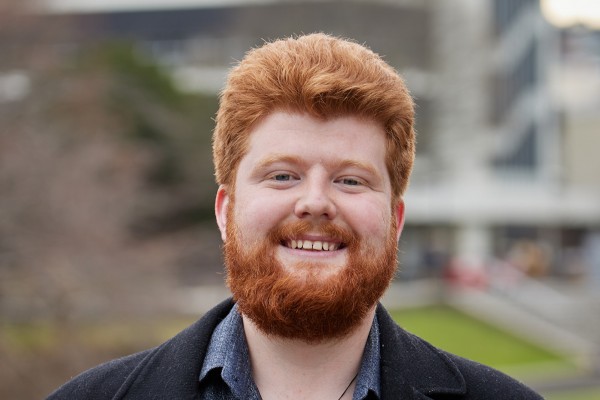Full disclosure: Elliot is Features Editor at Critic Te Ārohi. Rest assured that we grilled them exactly how we would grill any other council candidate.
Elliot Weir, a student doing their Masters in Ecology, is also running for a spot on the Otago Regional Council (ORC). As far as Critic Te Ārohi is aware, they are one of only two full-time Otago students running in local body elections this year (besides Jett Groshinski, who we covered in Issue 18, 2022). Like any good ecology student, they’ve set the task of improving Otago’s natural environment front-and-centre of their campaign.
In local elections, regional councils often seem a bit like an unloved, forgotten step-sibling. While city councils get to focus on sexy issues like pipes, parks and parking, regional councils usually have a much narrower scope (regional environmental issues and public transport). People often underestimate how important the ORC is, said Elliot: “[They] make decisions that impact things like the bus network, the health of our rivers, our preparedness for climate change, and the region’s greenhouse gas emissions.” Despite this, the ORC often flies under the radar, and Elliot’s concern is that if there is low voter engagement and low scrutiny of councillors “We [can] end up with a council that doesn’t truly represent our region.”
Elliot wants to improve the quality and outcomes of council decision-making. As they see it, “The council is essentially letting rivers run completely dry, because they can't agree on how much water should be taken. The rivers that do have water in them are unswimmable thanks to runoff and sedimentation. This was on top of the problems with the bus services this year, which is run by the ORC.” Elliot’s investigation into the ORC, published in Issue 17, highlighted its slow progress in developing a new plan for effective freshwater management. This echoed two separate reports into the ORC this year, which found strained relationships between councillors and staff seriously affecting their ability to function. While the most recent report has been criticised by several councillors, some have also called it fair.
“The current council is delaying really important decisions, and those delays will have consequences down the road for all of us,” said Elliot. “It was frustrating writing about these problems and not doing anything to try and fix them. So I decided to run,” they continued: “If I can get elected, that's one more vote towards positive change.”
Elliot told Critic Te Ārohi that their three priorities are “healthy rivers, better buses, and stronger climate change resilience.” While they admitted that these are “broad goals,” Elliot believes that there are many immediate steps the ORC could be taking that can lead to tangible improvements. For instance, they had a swathe of suggested improvements to our bus system: making fares free for under 25s, students, Community Services and SuperGold Card holders; rolling out an airport bus; setting up more on-demand routes for events like gigs and sports matches; bringing in electric buses; and renegotiating contracts, giving drivers better pay and conditions so there are enough to drive all these new services.
Having students stand for and be represented on councils which might otherwise be dismissed as “pale, male and stale” is important, according to Elliot: “We can't be surprised at low student voter turnout when none of the candidates are even close in age.” Despite this, they argue that taking an evidence-based approach can bring benefits to everyone, whether you’re a student or not: “[I will] make decisions based on the best available data, and I'm also confident that I will work constructively with whoever else is on council to make those decisions, and that those decisions will be made for the best interests of the everyone in the region.”
Regardless of who you vote for, Elliot says that this year’s elections are a golden opportunity to shake up the status quo. “There is a real opportunity to elect new councillors, who are going to do what's best for the land, water, and people of the region… It's important that we vote for councillors who will fight for the necessary changes, and also be willing to communicate and work constructively with other people to turn the current dysfunctional council into one that can make some real change.”






